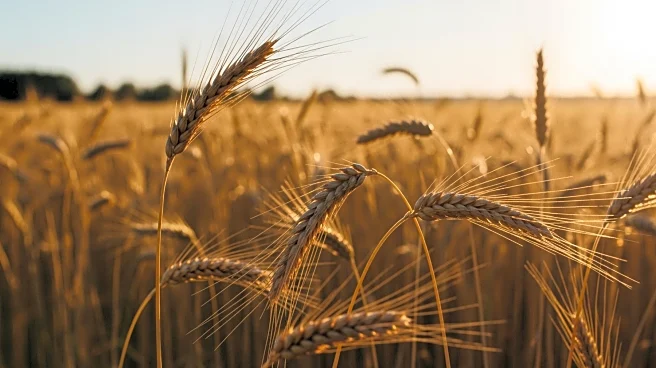What's Happening?
Egypt is targeting the procurement of five million metric tons of local wheat next season as part of its strategy to achieve self-sufficiency. Historically, Egypt has been one of the world's largest wheat importers, typically importing around 10 million tons annually.
The state buyer, Future of Egypt for Sustainable Development, has replaced the General Authority for Supply Commodities, reflecting a shift in procurement strategy. Despite the government's aim to procure more than four million tons during the domestic harvest, data shows a slightly lower achievement. The supply ministry assures that strategic commodity reserves are within safe buffers, comparable to or higher than last year.
Why It's Important?
Egypt's move towards self-sufficiency in wheat production is significant for its economic stability and food security. Reducing reliance on imports can mitigate the impact of global market fluctuations and geopolitical tensions. This strategy may influence domestic agricultural policies and investment in local farming infrastructure. The shift in procurement strategy could affect international trade dynamics, particularly with countries that export wheat to Egypt. Achieving self-sufficiency may enhance Egypt's resilience against external economic pressures and contribute to sustainable development goals.
What's Next?
Egypt may continue to invest in agricultural technologies and infrastructure to support increased local wheat production. The government might implement policies to encourage domestic farming and improve supply chain efficiency. Stakeholders, including farmers and agricultural businesses, will likely respond to these developments, potentially influencing market dynamics and pricing. The success of Egypt's self-sufficiency strategy could serve as a model for other countries seeking to reduce import dependencies.
Beyond the Headlines
The ethical implications of food security and self-sufficiency strategies may influence public policy and international relations. Legal frameworks governing agricultural practices and trade could be challenged as countries seek to balance domestic production with global market participation. Cultural dimensions, such as traditional farming practices and dietary preferences, may affect the implementation of new agricultural strategies. Long-term shifts in global food supply chains could result from changes in production and consumption patterns.















